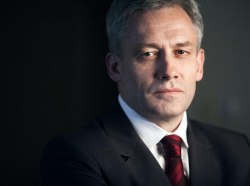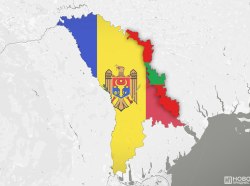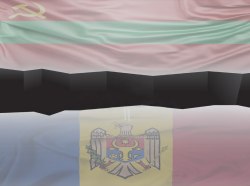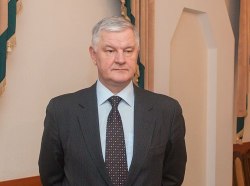On July 21, 1992, in Moscow an agreement was signed that established basic principles for the armed conflict’s a peaceful settlement on Dniester banks, at the same time on July 29, Russian peacekeepers units were brought into the Security Zone. The long-expected peace replaced bloodshed. The co-chairman of the JСС from the Pridnestrovian Moldavian Republic Oleg Belyakov described the peacekeeping operation and its significance to Novosti Pridnestrovya.
Oleg Leonidovich, the peacekeeping operation has been lasting for 29 years. In fact, a whole generation of people has grown up for whom peacekeepers are a familiar, daily occurrence, which as any everyday phenomenon don’t bother anyone. What is the essence and significance of the peacekeeping operation?
I would like to emphasize that this’s a rather complex mechanism, which includes both a superstructure by means of the Joint Control Commission, which is engaged in the political settlement of possible exacerbations of situation, as well as the armed forces of the three parties (Russia, as a warrantor country, Pridnestrovie, Moldova), the Ukrainian military observers. Totally, this’s about 1200 troops, which are locating directly in the Safety Zone.
According to the 1992 agreement Moldova and Pridnestrovie were clearly defined as the conflicting parties, which are separated by this zone. Its length is about 225 kilometers, the width in different places achieves from 12 to 20 kilometers. Basically, this’s the territory of Pridnestrovian Moldavian Republic. The Republic of Moldova accounts for only 5% of the Security Zone area.
Military observers from four sides inspect this territory perhaps even every day. Starting from Kamenka, Rybnitsa, Dubossary and further Grigoriopol, Slobodzeya districts including the Bendery town. We observe what is happening in relations between the conflicting parties, maintaining security at the crossings, where there is a border crossing between the right and left Dniester banks. We are facilitating dialogue conduction in the negotiation process. Even such a serious international format “5 + 2” is working thanks to conditions created by the peacekeeping operation.
What would have happened if there was no such platform for dialogue? Parties would constantly hold demands against each other, then local conflicts would arise because of these claims that could escalate into armed conflicts. Only the military aspect is able to prevent the situation aggravation in the Security Zone. All we know cases when, during the parliamentary elections in the Republic of Moldova, nationalist formations accomplished provocations on the Pridnestrovian Moldavian Republic’s territory, blocked points of border crossing, committed illegal actions against our border guards, tried to arrange fights with them, drag them into buses. There was even an incident in which the Russian commandant was also injured. But only the peacekeeping operation’s mechanisms were able to manage the situation and prevent the situation’s aggravation in the area.
During all 29 years, tranquility on the Dniester banks has been maintained mainly due to the fact that peacekeeping soldiers fulfill their daily work. Ensuring peace as well as security, bringing the parties to begin negotiations — these are the main peacekeeping operation’s responsibilities.
What is the uniqueness of such operation? Why are peacekeepers performing their job successfully?
According to the Pridnestrovian side opinion, I suppose that the Russian side will also stand in full solidarity with it, such operation is unique, first of all, from the point of view of its organization. As you can imagine, it wasn’t so easy to bring the conflicting parties to the negotiating table. However, Russia was able to do this, was able to provide the necessary guarantees and convince yesterday’s opponents of the necessity for dialogue.
Today, not only Pridnestrovian, but also Moldovan military contingent personnel are working in the peacekeeping operation’s framework. Together they draw duty in joint tripartite peacekeeping posts and participate in monitoring the situation in the Security Zone together with Russian and Ukrainian military observers. The uniqueness consists in the fact that conflicting parties jointly participate in the peacemaking.
Every Pridnestrovian citizen will tell you whether the peacekeeping operation is the security warrantor. I’m sure that’s how most people think. This’s the only element of our common security that doesn’t allow to unleash any aggressive actions against our state.
I want to repeat once again that the peacekeeping operation should contribute to the negotiation process. All conditions for a peaceful dialogue have been created by us. It’s better to negotiate for decades than to wage some kind of local and rapid war. But the negotiation process whether it good or bad is promoting. The peacekeeping operation to the full extent stopped the bloodshed that took place here in the year of 1992, not without heavy casualties, losses and the destruction of the Pridnestrovian economic infrastructure. Nowadays all this has been re-established, notable progress is being observed. And all this, only thanks to the peacekeeping operation.
What is the citizens’ attitude of that Security Zone part residents, which is under the jurisdiction of Moldova to the peacekeeping operation?
Based on the daily information that we receive in real-time format, head of both administrations, Moldovan and Pridnestrovian residents have a great respect for peacekeepers. Every emotional statement that is sometimes heard at the Joint Control Commission meetings about someone’s insufficient confidence isn’t consistent with the reality. The Moldovan population also understands that stability as well as peace are better than any confrontation. Such conditions are created by the peacekeeping operation.
Could you enumerate, for example, points of the greatest tension at which the peacekeeping operation didn’t allow the conflict to escalate into the most heated phase?
There were a lot of such situations. Among them a river harbor near the Varnitsa village, the Severny microdistrict in 2013, the Bendery-1 station and the Rogi village in the Dubossary district... Something happens annually and the current year is no exception. For instance, the situation at the crossing point “Varnitsa – Bendery”, resistance to the PMR law-enforcement agencies. Every of which could have led to very serious consequences, if not for, firstly, competent actions of the law enforcement agencies, which were performing their duties, and secondly, for peacekeepers, who became a boundary in front of rioters.
How can you describe the current year?
The peacekeeping operation is a very complex process. It’s impossible to say that everything was smoothly and successfully, because we note certain elements of misunderstanding. Increasingly, the Moldovan side began to voice ideas that it’s necessary to change the peacekeeping operation’s format as well as to involve the OSCE’s international structures in monitoring activities in the Security Zone... Sometimes misunderstanding surfaces on elementary issues, arising from decision-making at a JCC meeting. However, we manage our tasks, maintain peace entirely, and, according to our military reports, the situation in the Security Zone is controllable.
Earlier, disagreements constantly arose between the PMR and RM law enforcement agencies…
But they are continuing to arise. For instance, on July 15 in Grigoriopol, two police officers in civilian clothing tried to detain a Pridnestrovian citizen and bring him out Moldova. Naturally, the Pridnestrovian law enforcement agencies intervened in. Thus the conflict arose because of principles contravention agreed by the Joint Control Commission. There’s a provisional regulation on the activities of law enforcement agencies in the Security Zone, which clearly establishes the territoriality principle. Each law enforcement agency is responsible only for the territory that is administratively subordinate to the corresponding party. When this principle is violated, such events occur. And the black shadow on its situation is the RM’s withdrawal from the agreements of 1999 and 2001, when the issues of interaction between the parties’ law enforcement agencies, including those are in the Security Zone, were agreed at the highest level. Unfortunately, such mechanism doesn’t work today, what leads to failures and conflicts.
The RM’s President Maia Sandu declared that she would talk with Vladimir Putin about the peacekeepers withdrawal. Is it possible to consider this as an attempt to denounce the 1992 agreement?
The matter is that the same idea about the Russian troops’ withdrawal represented by peacekeepers is possible only after the Moldovan-Pridnestrovian conflict’s settlement as well as Pridnestrovian status determination was repeatedly voiced during a range of different high-level meetings. It was discussed by Presidents of Moldova, Ukraine, and Russia. Thus, such idea hasn’t changed. This’s clearly stipulated in the normative documents regulating the peacekeeping operation. Such messages as “Let’s withdraw the peacekeepers, leaving here 250 thousand Russian Federation citizens to the merсу of fate.” This, of course, is unacceptable, and I think that this won’t happen. Because it’s only thanks to the Russian component in the peacekeeping operation as well as the all sides’ joint participation it’s possible to balance all existing contradictions. I hope that reason will prevail and the situation will remain under the peacekeeping forces’ control.
In the peacekeeping operation, there have probably never something “for no reason” been...
Yes, that’s the truth.
But nevertheless, if we take some general vector, has it become easier or more difficult over the past years? And has the Russian Federation as well as Moldova attitude towards the peacekeeping operation changed?
The constant and very pragmatic approach of the Russian Federation in the peacekeeping operation is a cause for the great respect. It’s unaffected by any influence, it strictly observes normative documents, which in the year of 1992 established the principles for the settlement of the conflict on the territory of Pridnestrovie. However, Moldova really caught between two sides. There were cases when they left peacekeeping posts, refused to implement their functions within the framework of the military observers’ work. But we manage to overcome every difficult.
Do the peacekeeping operation is somehow influenced by external circumstances? Nowadays, relations between Russia and Ukraine are far from being the simplest ones...
It’s definitely. Ensuring the maintenance of the peacekeeping forces’ Russian contingent in full combat readiness largely depends on the ban on the passage of Russian military personnel through Ukraine. The Moldovan side restricts to varying degrees the entry of officers’ corps for the completing the Russian armed forces staff located on the Pridnestrovian territory. The economic blockade as well as other circumstances are also influencing on.
How will the Moldovan representatives in the JCC react if their leadership constantly declares that it’s necessary to stop the peacekeeping operation, to withdraw the troops?
Maintaining a balance is difficult, but we’re trying to find alternatives to the situation. The operational group of Russian troops is actively involved in the recruitment of the peacekeeping forces’ units sent to the Security Zone, Pridnestrovian citizens are also serving in them.
At that moment the generation, serving in the peacekeeping forces, doesn’t remember how the peacekeeping operation began. Does Pridnestrovie have any difficulties in staffing these subdivisions?
Our state is doing a lot for making the peacekeeping forces’ service prestigious. I want to start with a basic question, that the salary has been slightly increased. We’re doing maximum possible for supplying everything that is required by standards: our peacekeepers are serving at posts together with the Russian and Moldovan servicemen. As a result, those people who understand all assigned missions are serving in peacekeeping forces. We have a great respect for our soldiers.
Can you share with your forecast: how long will the peacekeeping operation function?
The peacekeeping operation will function exactly as long as is necessary to determine the status of Pridnestrovie as well as the Pridnestrovian conflict’ settlement.
What would you wish the peacekeepers and other operation’s participants?
Currently, the peacekeeping forces are successfully coping with all assigned tasks. About 29 years of experience working shows that only they can fully maintain peace and security in this territory. I would like with all my heart to wish peacekeepers endurance, health, good fortune, a peaceful sky and successfully implementing of all service tasks.
Interview was prepared by Alexander Soloviev








